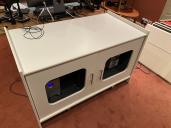
-
I find myself temporarily displaced from my study. I've got minimal kit set up in my living room, and I found that my raid arrays have some physical vibration that goes through the desk/table and makes editing and mixing sound a PITA.
I've tried several designs, but came up with these as simple pucks to decouple the boxes from the desk:
Basically the web is printed in TPU/TPE and the thickness controls the compliance - thicker for heavier boxes.
The ring is printed in anything - PLA/PETG or whatever you have around.
Regards
Andy
-
Usually in every store you can find anti vibration pads for washing machines and alike. Sometimes need to use 2-3 of them.
-
Have a look at Sorbothane. Its really creazy stuff - rubber which is keeping a stable shape but with extremely high dampening (sometimes described as beeing similar to human flesh).
You can find it in different shapes and hardneses on Ebay. Can easily be cut with a (very sharp) knife.
-
@pscyo Yes Sorbothane is really really good. £52 for a pack of 4 from Amazon!
It would be interesting to do a back to back test against my 3d printed parts which cost pennies - although I guess it was at least an hour of my time.
I have 4 raid enclosures at the moment - which would be £208 to isolate.
I notice that ebay has sheets of the stuff.
@vitaliy Your suggestion is even cheaper at £12 for 4. I'll make a test order.
Cheers
Andy
-
Solution is SSD drives, no noise
Also some CPU coolers and GPU coolers are very silent
-
@andyharris Why so expensive? You can get Sorbothane dampers or sheets much cheaper (on Ebay).
-
@apefos I have about 150TB of spinning drives. So SSDs are not cheap. But I could see using 8TB NVMe m.2 for active projects - it would be interesting to have software to help back this off to the spinning disks - which could be in a different room over a network connection.
@pysco - I could see using 5mm sheet in a 3 high sandwich to get the same result.
Because I generally shoot in 12K RAW i'm using a lot of space, although I don't need to keep the RAW forever.
-
@andyharris 10G is now very cheap and could even be delivered via thunderbolt to Laptop or PC. https://www.bhphotovideo.com/c/product/1452479-REG/qnap_qna_t310g1s_single_port_thunderbolt3_to.html
If you split it right, you could end up even spending less on the long run, as this rig seems to drain a lot. You could use a nearly silent small rig on your desk, put your server away and tune it to standby when not being requested.
If I remember well vitaliy made a useful topic about it some time ago https://www.personal-view.com/talks/discussion/21464/humble-editing-system
-
@RoadsidePinic My QNAP already has 10GB Ethernet (as does the iMac Pro).
However the Thunderbolt 3 file serving performance is 4-5 times better (because you're going through network and file-serving layers). I also have a ThunderB1 and ThunderB2 drives of 30 and 50TB so its like an old collection I've had for a while.
It's an interesting thought to create a small server with 10GB ethernet and jumbo frame support. iSCSI would be another option for the future.
Here's a photo of my quiet box:

 IMG_4785.jpg2048 x 1536 - 1M
IMG_4785.jpg2048 x 1536 - 1M -
I have about 150TB of spinning drives. So SSDs are not cheap. But I could see using 8TB NVMe m.2 for active projects
Just start using 10bit HEVC for everything important and 8bit H264 for all else, you have no reason to store raw.
Will save you 90% of space.
-
If you use Windows and proper 10Gbit adapters file work can be really fast, but need RDMA.
https://www.personal-view.com/talks/discussion/21474/fast-10-100gbit-networks-for-video-editors/p1
Also, if you are really serious, you need to get used Infiniband adapters and move to NVME.
Such way you can have NVME speeds while having remote storage.
Howdy, Stranger!
It looks like you're new here. If you want to get involved, click one of these buttons!
Categories
- Topics List23,993
- Blog5,725
- General and News1,354
- Hacks and Patches1,153
- ↳ Top Settings33
- ↳ Beginners256
- ↳ Archives402
- ↳ Hacks News and Development56
- Cameras2,368
- ↳ Panasonic995
- ↳ Canon118
- ↳ Sony156
- ↳ Nikon96
- ↳ Pentax and Samsung70
- ↳ Olympus and Fujifilm102
- ↳ Compacts and Camcorders300
- ↳ Smartphones for video97
- ↳ Pro Video Cameras191
- ↳ BlackMagic and other raw cameras116
- Skill1,960
- ↳ Business and distribution66
- ↳ Preparation, scripts and legal38
- ↳ Art149
- ↳ Import, Convert, Exporting291
- ↳ Editors191
- ↳ Effects and stunts115
- ↳ Color grading197
- ↳ Sound and Music280
- ↳ Lighting96
- ↳ Software and storage tips266
- Gear5,420
- ↳ Filters, Adapters, Matte boxes344
- ↳ Lenses1,582
- ↳ Follow focus and gears93
- ↳ Sound499
- ↳ Lighting gear314
- ↳ Camera movement230
- ↳ Gimbals and copters302
- ↳ Rigs and related stuff273
- ↳ Power solutions83
- ↳ Monitors and viewfinders340
- ↳ Tripods and fluid heads139
- ↳ Storage286
- ↳ Computers and studio gear560
- ↳ VR and 3D248
- Showcase1,859
- Marketplace2,834
- Offtopic1,320
Tags in Topic
- disks 3







